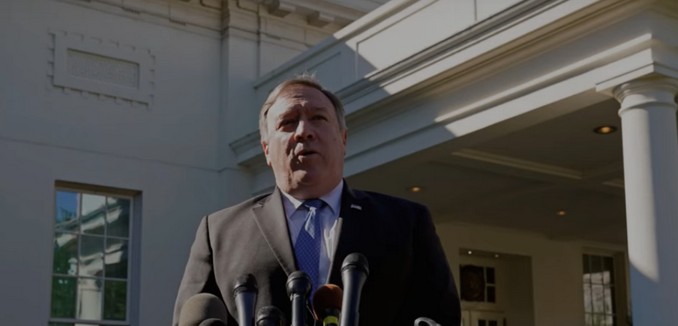The Trump administration announced that it will re-impose all sanctions on Iran that had been lifted as the result of the 2015 nuclear deal, the Associated Press reported Friday.
In a conference call announcing the administration’s intent to reinstate the harsh sanctions, United States Secretary of State Mike Pompeo said that the sanctions are “aimed at fundamentally altering the behavior of the Islamic Republic of Iran.” Pompeo had previously identified twelve activities Iran needed to change to escape the re-imposition of all pre-nuclear deal sanctions. These include ending its nuclear weapons and ballistic missiles program, stopping its support of terror, and respecting the sovereignty of neighboring nations.
In recent weeks, Iran’s continued support for terror and its refusal to allow adequate inspections of its nuclear program have been reported on.
When he announced that the U.S. would withdraw from the nuclear deal, President Donald Trump cited the deal’s weakness in allowing Iran to resume its nuclear weapons program and failing to restrain any of Iran’s other malign activities as reasons for pulling out.
While the U.S. is allowing eight countries to continue purchasing oil from Iran without penalty — reportedly including Turkey, Italy, India, Japan and South Korea — they are expected to reduce their oil imports from Iran over the next months.
Pompeo charged that Iran uses its oil revenues “on unlawful ballistic missiles, terrorism, cyberattacks, and other destabilizing activities like the assassination plot Denmark disclosed this past week.”
“And starting today,” Pompeo said, “Iran will have zero oil revenue to spend on any of these things. Let me say that again. Zero. One hundred percent of the revenue that Iran receives from the sale of crude oil will be held in foreign accounts and can be used by Iran only for humanitarian trade or bilateral trade in nonsanctioned goods and services.”
Money from those sales will be placed into an escrow account to be used for what the AP described as “a narrow range of humanitarian items.”
Treasury Secretary Steven Mnuchin, who was also on the conference call, said, “we have advised SWIFT the Treasury will aggressively use its authorities as necessary to continue intense economic pressure on the Iranian regime, and that SWIFT would be subject to U.S. sanctions if it provides financial messaging services to certain designated Iranian financial institutions.” SWIFT stands for Society for Worldwide Interbank Financial Telecommunication, an organization that facilitates messaging among the world’s banks.
Mnuchin also said that once the U.S. would designate an Iranian bank, SWIFT would be responsible for disconnecting from that bank as quickly as possible or face U.S. sanctions.
“Administration is rolling out the financial pressure component of its maximum pressure campaign against the Islamic Republic more successfully than many anticipated,” sanctions expert, Mark Dubowitz, the CEO of the Foundation for the Defense of Democracies, tweeted. However, he cautioned, “But no victory laps. Much more to play out. Much more to do. Much that can go wrong.”
Dubowitz also cautioned that Iran could be expected to exploit the humanitarian loophole to evade sanctions.
[Photo: Wochit Entertainment / YouTube ]




